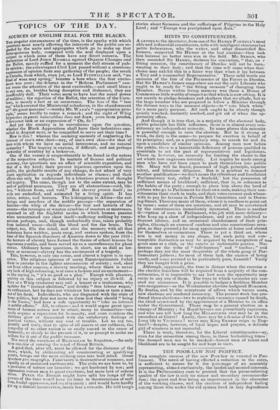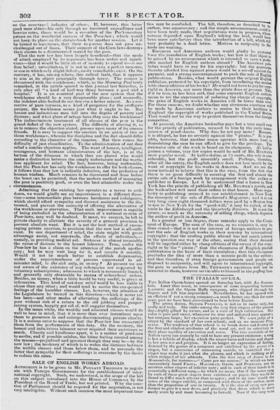THE POOR-LAW NOT PERFECT.
THY complete success of the new Poor-law is vaunted in Par- liament. The merit of having effected a reduction in the rates, is sufficient to secure for it the patronage of an assembly representing, almost exclusively, the lauded and monied interests. It is the Parliamentary cant to pretend that the purse-relieving quality of the law is only its minor and secondary recommenda- tion; the great and first being an improvement in the character of the working classes, and the creation of independent feeling among those who under the old system lived in lazy dependence
on the over-taxel industry of other-. If, however, this latter good were obtainable only through an increased expenditure and heavier rates, there would be a cessation of the Parliamentary pteans on the wonderful success of the Poor-law ; which would not keep its place on the statute-book for another session. Let it be hinted to leeislators, that their hypocrisy does not pass un- challenged out of doors. Their support of the Corn-laws destroys their claims to a disinterested regard for the poor.
That the new law has been largely beneficial—that the mode elf attack employed by its opponents has been unfair and injudi-
cious—that it would be little sh,mrt of insanity to repeal it—is our
firm belief: nevertheless, it is not in our eyes a perfect measure, or one in which only slight defects, easily remediable. exist. On the contrary, it has, among others, this radical fault, that it appears
to aim at its object principally through terror. The pauper is threatened with the workhouse; w hich , as the Morning Post truly remarked, in the article quoted in this journal last Saturday, is only after all " a kind of haltway thing between a gaol and a hospital." It is an essential part of the new system that the workhouse should be a very disagreeable place ; and assuredly, the indolent able-bodied do not deserve a better retreat. As a cor- rective of pure laziness, as a kind of purgatory for the profligate pauper, the writ khouse seems just what it ought to be. But honest and industrious men fall into the depths of poverty and distress; and what place of refuge have they save the workhouse? The indiscriminate treatment of all classes of the penr is the grand defect of the new system. The difficulty of altering it, so as to remove the objection stated, presses upon many of its sincere friends. It is easy to suggest the erection in an union of two or three workhouses, wherein the discipline and the diet should differ according to the character of the inmates. But then comes the difficulty of just classification. To the administration of outdoor relief a similar objection applies. The want of honest, intelligent, courageous, and humane administrators of the law, is at the bottom of the dilemma in which they are placed who would make a distinction between the simply unfortunate and the worth- less applicant for relief. The fact, however, being undeniable, that the Poor-law has only the workhouse to offer for both classes, it follows that that law is radically defective, not the perfection of human wisdom. Much remains to be discovered and done before the boast can be permitted, that the modern method of managing the poor is positively good, or even the best attainable under the
t circumstances.
Admitting that the existing law operates as a terror to evil- doers, we would gladly see an improvement in a different direc- tion—some intermediate plan between harshness and indulgence, which should afford sympathy and discreet assistance to the dis- tressed, and prevent the necessity of offering the alternative of the workhouse or starvation. That such improvement is capable of being embodied in the administration of a national system of Poor-laws, may well be doubted. It must, we suspect, be left to private charity to alleviate the severity of a general provision to prevent absolute want. But it is not the best method of encou- raging private exertion, to proclaim that the new law is all-sutli- cient. In one department of relief, the state might with great advantage assist, not supersede, the efforts of individuals,— namely, in providing medical aid. Sickness is almost invariably the cause of distress to the honest labourer. True, under the Poor-law he has a claim on the attention of the parish apothe- cary; but he may wait long for it, and receive it scantily. Would it not be much better to establish dispensaries, under the superintendence of persons empowered to ad- minister relief, to the sick only, in money At present we are not aware of the existence of any infirmaries not supported by voluntary subscriptions; admission to which is necessarily limited, and generally only obtainable by means of subscribers' orders. Besides, no money, when a little would be very useful, is given at infirmaries. This kind of out-door relief would be less liable to abuse than any other ; and would tend to soothe the exasperated feelings of the humbler classes. Let, however, the attention of the Legislature be turned in this direction—which it never yet has been—and other modes of alleviating the sufferings of the poor without risk of a return to the old jobbing and pauper- raising system, happily got rid of, will suggest themselves. In the mean while, the wealthy and educated classes would do well to bear in mind, that it is more than ever incumbent upon them to persevere in and enlarge discriminating private charity. It is a serious error to suppose that the Poor-law has exonerated them from the performance of this duty. On the contrary, the honest and industrious labourer never required their assistance so much. Charity and kindliness apart, it is a matter of prudence to soothe, and if possible subdue, the bitter feeling created among the masses—prejudiced and ignorant though they may be—by the new law ; the tendency of which is to widen the distance between the middle classes and those below them, and to persuade the latter that sympathy for their sufferings is overcome by the desire to reduce the rates.



























 Previous page
Previous page